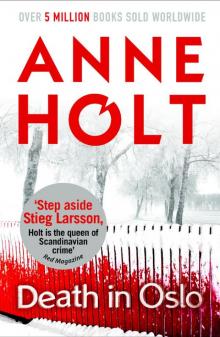Hanne Wilhelmsen - 01 - The Blind Goddess Read online
Page 4
In her third year as a student, Karen Borg had obtained her final summer job with this rock-solid firm. Hard work and an incisive mind were greatly esteemed at Greverud & Co. She was only the fourth woman ever to have had the opportunity, and the first to succeed. When she passed her exams a year later, she was offered a permanent position, interesting clients, and an immorally high salary. She fell for the temptation.
She’d never actually regretted it. She’d been sucked into the exciting world of capitalism, and was involved in the real-life game of Monopoly during its most thrilling decade. She was so talented that she was offered a partnership after a record three years. It was impossible to say no. She was flattered, pleased, and felt she deserved it. Now she earned one and a half million kroner a year, and had almost forgotten her reasons, all those years ago, for actually embarking on the study of law. Sigrun Berg ponchos had given way to elegant suits purchased for a fortune on Bogstadsveien.
The telephone rang. It was her secretary. Karen Borg pressed the loudspeaker button. This was uncomfortable for the person phoning, because her voice was surrounded by an echo that made it indistinct. She felt it gave her an advantage.
“There’s a lawyer called Peter Strup on the line. Are you in, at a meeting, or have you left for the day?”
“Peter Strup? What can he want with me?”
It was impossible to hide her astonishment. Peter Strup was—besides much else—the chairman of the Defence Group, the special union of defence lawyers who regarded themselves as either too good or too bad simply to be members of the Norwegian Lawyers’ Association like everyone else. A year or so previously he had been voted Norway’s most eligible man, and was well known as one of the most frequent media pundits on just about any subject. He was in his sixties, but looked forty, and his time for the Birkebeiner Ski Race was up among the best. He was also said to be a friend of the Royal Family, though he would never confirm this in the presence of journalists.
Karen Borg had neither met him nor spoken to him. She had often read about him, of course.
“Put him through,” she said, after some slight hesitation, and picked up the receiver in an unconsciously respectful gesture.
“Karen Borg,” she said, in a flat and expressionless voice.
“Good afternoon, this is Peter Strup. I won’t take up much of your time. I hear you’ve been appointed defence counsel for a Dutchman charged with last Friday’s murder by the River Aker. Is that right?”
“Yes, that’s correct as far as it goes.”
“As far as it goes?”
“Well, I mean, it’s true that I’ve been appointed, but I haven’t talked to him very much yet.”
She riffled involuntarily through the papers in front of her, the defence counsel’s copies of the murder case. She heard Strup laugh, a charming laugh.
“Since when have you been working for four hundred and ninety-five kroner an hour? I didn’t think legal aid rates would even cover the rent on Aker Brygge! Have things got so bad that you’re having to poach on our territory?”
She didn’t take offence at this. Her hourly rate was often well in excess of two thousand kroner, partly depending on who the client was. Even she had to laugh a little.
“We get by. It’s purely a matter of chance that I’m helping this chap.”
“Yes, that’s what I thought. I’ve got enough to do, but I’ve been approached by a friend of his enquiring whether I can help the boy. An old client of mine, this friend, and we defence lawyers have to look after our clients, as you know!”
He laughed again.
“In other words, I don’t mind taking the case on, and I can imagine you’re not particularly keen on it.”
Karen wasn’t quite sure what to say. The chance to put the whole matter in the hands of the best defence counsel in the country was very tempting. Peter Strup would undoubtedly do it better than she could.
“Thanks, that’s kind of you. But he’s insisted on having me, and in a way I’ve promised him I’ll continue. Of course I’ll pass on the offer to him, and I’ll ring you back if he wants to take it up.”
“Okay, we’ll leave it at that, then. But you obviously appreciate I’ll need to know soon. I’d have to familiarise myself with the case, and see if there’s anything that can be done.”
Their conversation drew to a close.
She felt a little perplexed. Even though she knew it was far more common among criminal lawyers to steal clients, or make strategic changes of lawyer, as it was more likely to be described, she was very surprised that Peter Strup had to have recourse to such measures. She’d seen his name recently in a newspaper report as one of three examples of the way cases were being delayed for months or even years because the most well-known lawyers had such long waiting lists. On the other hand, it was nice that he wanted to help, especially when the approach came at the instigation of one of Van der Kerch’s friends. She could see the attraction of this caring attitude, though she herself kept all her clients at arm’s length.
She closed the file in front of her, noticed that it was four o’clock, and decided to stop work, changing the board above the reception desk to indicate that she was the first of the lawyers to leave. She still couldn’t avoid a slight prick of conscience every time there weren’t at least ten names before hers under the “In tomorrow” sign. But today she managed to dismiss it easily, and walked out into the rain and caught an overcrowded tram home.
* * *
“I’ve taken on a criminal case,” she mumbled between two mouthfuls of Frionor fish.
Karen Borg was from Bergen. She didn’t eat fresh fish in Oslo. Fresh fish shouldn’t have been dead for more than ten hours. Forty-eight-hour-old fish in the capital tasted like rubber, and the properly frozen output of a mass production line was actually better.
“Though it would be more accurate to say it was foisted upon me,” she added as she finished chewing.
Nils grinned.
“Will you be able to cope with it? You often complain you’ve forgotten everything you learnt except what you’ve been doing for the last eight years,” he said, wiping his mouth with the back of his hand, an annoying habit that Karen had been trying to eradicate for all of the six years they’d been living together, partly by drawing his attention to it, partly by pointedly laying large napkins by his plate. The napkin lay untouched, and he repeated the offence.
“Well, depends what you mean,” she muttered, surprised at herself for feeling hurt, especially since she had had exactly the same thoughts earlier in the day. “Obviously I can, I’ll just have to brush up a little.” She resisted the temptation to add that she’d got a pretty good mark for her finals paper on criminal law.
She told him the whole story. For some reason she omitted the telephone call from Strup. She didn’t know why. Perhaps it was because she felt uncomfortable about it. Ever since she was a child she had been reticent in matters that seemed complex. Anything dubious she kept to herself. Not even Nils really understood her. The only one who had ever come close to breaking through her defences was Håkon Sand. After he disappeared from her life, she became expert at sorting things out for herself in silence, and sorting things out for others for a living.
They’d eaten their meal by the time she’d finished talking. Nils began clearing the table, without seeming uninterested in her story. Karen sat down in an armchair, reclined the seat, and heard him loading the dishwasher. Eventually the rattling was accompanied by the gurgle of the coffee percolator.
“He’s clearly scared to death,” he shouted from the kitchen, then looked into the living room and reiterated it, “I think he’s bloody scared of someone.”
Brilliant. As if it wasn’t obvious. Typical of Nils, he had an ability to come out with self-evident comments that for many years she’d found appealing, almost as if he were being deliberately sardonic. But lately she’d come to realise that he actually thought he could perceive what others couldn’t.
“Of course he’s
scared,” she murmured to herself, “but what is it he’s scared of?” Nils came in with two cups of coffee.
“Well, he’s clearly not afraid of the police,” she said as she took the cup. “He wanted to be arrested. Just sat right down in a busy street and waited for them to arrive. But why wouldn’t he say anything, why wouldn’t he admit he’d killed the man by the River Aker? Why is he afraid of prison if he’s not afraid of the police? And why of all things should he insist on having me as his lawyer?”
Nils shrugged his shoulders and picked up a newspaper.
“You’ll find out eventually,” he said, becoming engrossed in the comic strips.
Karen shut her eyes.
“I’ll find out eventually,” she repeated to herself, and yawned as she stroked the dog behind the ear.
TUESDAY 29 SEPTEMBER
Karen Borg had had a restless night. Not in itself an unusual occurrence. She was always tired in the evenings, and fell asleep within minutes of going to bed. The problem was that she always woke up again. Mostly at about five o’clock in the morning. She would still be tired and heavy with sleep, but incapable of drifting back into the world of dreams. Her problems seemed immense at night, even the ones that by day were little more than fleeting shadows. Things that were so easy to play down in the light of day as mundane, unthreatening, or mere irritations, became in this transition period before dawn pervasive menacing spectres looming over her. All too often she would lie there twisting and turning until half past six or so, and then drop into a deep unconscious sleep until the alarm clock jerked her out of it only half an hour later.
Last night she’d woken at two, drenched in sweat. She’d been sitting in an aeroplane with no floor, and the passengers were having to balance without safety belts on little projections attached to the aircraft walls. After clinging on tight until she was faint from exhaustion, she felt the plane go into a sudden steep descent towards the ground. She woke as it crashed into a hill. Dreams about plane crashes were supposed to be a sign of lack of control over one’s life. But she didn’t feel that could apply to her.
It was a bright autumn day for once. It had been pouring with rain all week, but last night the temperature had risen to fifteen degrees Celsius, and the sun was making a final effort to remind everyone that it was not so very long since summer after all. The trees on Olaf Ryes Plass were already turning reddish yellow, and the light was so strong that even the Pakistani shopkeepers looked pale as they set up their wares on the street outside their kiosks and grocery shops. There was a roar of traffic from Toftes Gata, but the air smelt surprisingly fresh and clean.
When Karen had become the youngest—and only female—partner in Greverud & Co. five years previously, she and Nils had seriously discussed leaving the Grünerløkka area. They could easily afford to, and Grünerløkka hadn’t developed the way everyone was anticipating at the time she acquired a flat in a block then under threat of demolition but reprieved by the Oslo City Renovation Project. The rescue had been a halfhearted attempt at restoration, at an insane cost, and resulted in a fifteen-fold rent increase in three years. The least well-off had to move out, and had it not been for the fact that the creditors had nothing to gain by forcing the whole property company into liquidation, it might have been disastrous. But Karen had sold the flat at the right time, just before the big property crash in 1987, and had emerged with a reasonable sum for her new abode, a loft apartment in the adjoining block, which had miraculously escaped the Renovation Project because the residents had themselves undertaken to carry out the City Council’s area conservation plans.
Karen and Nils had really set their hearts on moving. But late one extraordinary Saturday night a year or so ago they had sat down and analysed their motives. They compiled a list of pros and cons, as if preparing an answer to an examination question. They ultimately concluded that they should use the money to extend their little flat instead. They strengthened the housing association’s finances by purchasing the remainder of the loft, almost 200 square metres. It was very luxurious by the time it was completed and had risen enormously in value. They had never regretted it. When they’d both come to accept with remarkable equanimity that they would not have children, a tacit admission that had developed between them by the time they had been abstaining from contraception for four or five years without it leading to anything, they had started to forget all their friends’ arguments about the pollution in Oslo city centre. They had a terrace with a Jacuzzi and barbecue, no gardening to do, and could walk to the nearest cinema without too much exertion. Even though they had a car, a Ford Sierra bought secondhand in view of the inadvisability of investing too heavily in a vehicle that would be parked in the street, they mostly used the tram or went on foot.
Karen had grown up in the pleasant residential district of Kalfaret in Bergen. It had been a childhood spent under the surveillance of the sophisticated local intelligence services, with agents peering out from behind curtains, always fully informed of everyone’s slightest misdemeanours, from unwashed floors to extra-marital affairs. After a weekend visit home a couple of times a year Karen would be seized by a feeling of unbearable claustrophobia that she couldn’t entirely account for, especially as she herself had never had anything to hide.
So Grünerløkka for her was a place of refuge. She and Nils had stayed put, and now had no intention of ever moving.
She paused in front of the little kiosk opposite the tram stop. The tabloid newspapers were piled high in their respective stands.
“Brutal drugs murder shakes police.” The headline leapt out at her. She picked up a copy, went in reading it, and put the money on the counter with hardly a glance at the man behind the counter. The tram arrived as she came out. She stamped her ticket and sat down on a folding seat. The front page referred her to page five. Beneath a photograph of the corpse that she herself had found only four days ago, the text stated that “The police believe the brutal murder of an as-yet-unidentified man in his thirties to be a revenge killing in the drugs world.”
No sources were given. The story was uncannily close to what Håkon Sand had told her.
She was infuriated. Håkon had emphasised that what had been said between them was not to go any further. The caution had been completely superfluous; there was no one Karen had less time for than journalists. She was all the more annoyed by the police’s own bungling.
She wondered about her client. Would he get newspapers in his cell? No, he’d accepted a ban on letters and visits, and she seemed to recall that it also included a ban on newspapers, TV, and radio. But she wasn’t sure.
“This will make him even more afraid,” she thought, and turned her attention to the rest of the newspaper as the modern tram rolled and hummed along through the city streets with a smoothness so unlike the clatter of its predecessors.
* * *
In another part of the city a man was in abject fear of imminent death.
Hans E. Olsen was as ordinary as his name. Too much alcohol over too many years had left its mark on his face. His flesh was flabby and grey, with prominent pores, and always sweaty. But his permanently sour expression stemmed more from an innate bitterness than from his excessive consumption of alcohol. Right now he was sweating more than ever, and looked older than his forty-two years.
Hans E. Olsen was a lawyer. He had shown some promise in his early years as a student, and had attracted a number of friends. But his upbringing in a pious environment in southwest Norway had put a leaden weight on any vigour and joie de vivre he might have had. His childhood faith had been jettisoned after a few months in the capital, leaving the young man with nothing to put in its place. The concept of a vengeful and implacable God had never really lost its hold on him, and torn between his former self and the dream of the student life of wine, women, and academic achievement, he had all too soon sought his consolation in the temptations of the big city. Even in those days his fellow students used to joke that Hans Olsen never used his cock for anything but pe
eing. But this was an assertion in need of qualification: he had discovered at an early stage that sex could be bought. His lack of charm and self-confidence had soon led him to the resentful realisation that women were not interested in him. He had become a frequent visitor to the red-light district around the city hall, and had thus accumulated a lot more experience than his fellow students gave him credit for.
His alcohol consumption, which increased so rapidly that by the age of twenty-five he was being referred to as an alcoholic—though from a medical point of view this was not strictly accurate—prevented him from passing his law examinations with a result commensurate with his original talents. He gained a mediocre degree, and took a job at the Ministry of Agriculture. He stayed there for four years before setting up on his own, after two years’ practical work as an assistant judge in northern Norway, a period he now regarded with horror, but which had been a necessary evil to achieve his lawyer’s licence and the freedom he felt he had always been seeking.
He had found a practice of three lawyers with a vacancy for a partner. They soon realised that he was an awkward character with an unpredictable temper. But they accepted him as he was, not least because, unlike others, he was always, without exception, up-to-date with the rent and his share of the joint expenses. They assumed this had more to do with his own modest expenditure than with any great earning capacity. Hans Olsen was, in a word, miserly. He had a predilection for grey suits. He had three—two of them more than six years old, and it showed. None of his colleagues had ever seen him in anything else. He spent his money on just one thing: alcohol.
For a brief period he had blossomed out, to everyone’s amazement. The surprising turn in his life manifested itself in his more frequent hair washing, his use of an exclusive aftershave that for a short while overpowered the musty, slovenly body odour that permeated his office, and in the fact that he turned up one morning wearing a pair of new Italian, and, in his secretary’s opinion, extremely suave, shoes. The cause of the transformation was a woman who was actually willing to marry him—after only three weeks’ acquaintance, which in reality meant about fifty pints in the Old Christiania pub.

 A Grave for Two
A Grave for Two Dead Joker
Dead Joker Death of the Demon: A Hanne Wilhelmsen Novel
Death of the Demon: A Hanne Wilhelmsen Novel Punishment aka What Is Mine
Punishment aka What Is Mine Beyond the Truth
Beyond the Truth Death in Oslo
Death in Oslo The Blind Goddess
The Blind Goddess What Never Happens
What Never Happens 1222
1222 In Dust and Ashes
In Dust and Ashes Odd Numbers
Odd Numbers What is Mine
What is Mine What Dark Clouds Hide
What Dark Clouds Hide Blessed Are Those Who Thirst
Blessed Are Those Who Thirst Fear Not
Fear Not No Echo
No Echo Hanne Wilhelmsen - 01 - The Blind Goddess
Hanne Wilhelmsen - 01 - The Blind Goddess